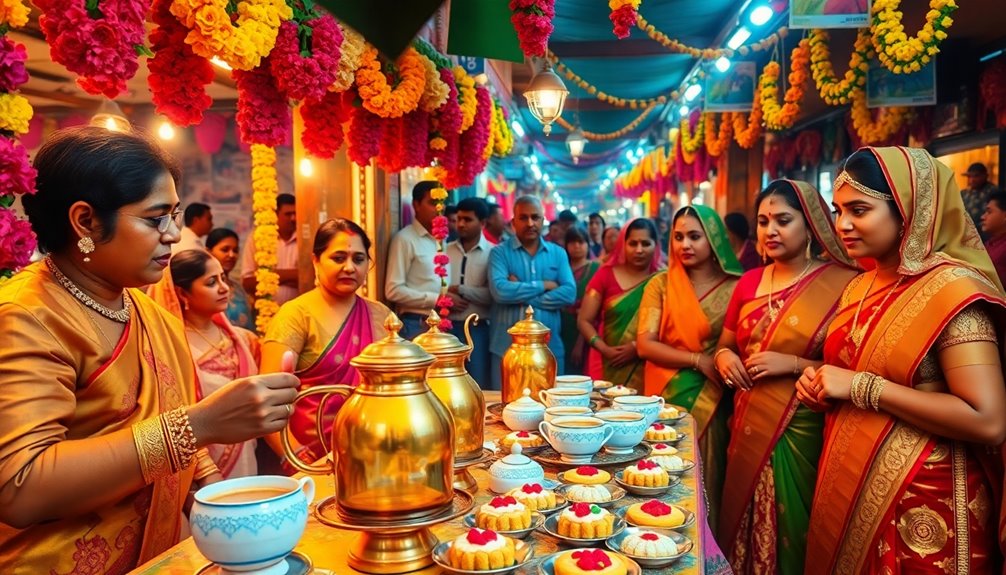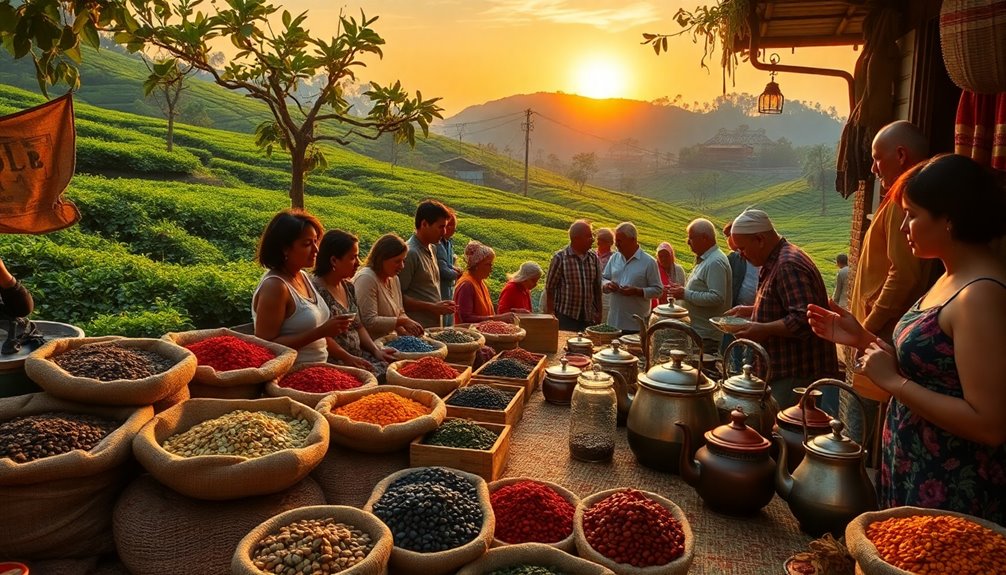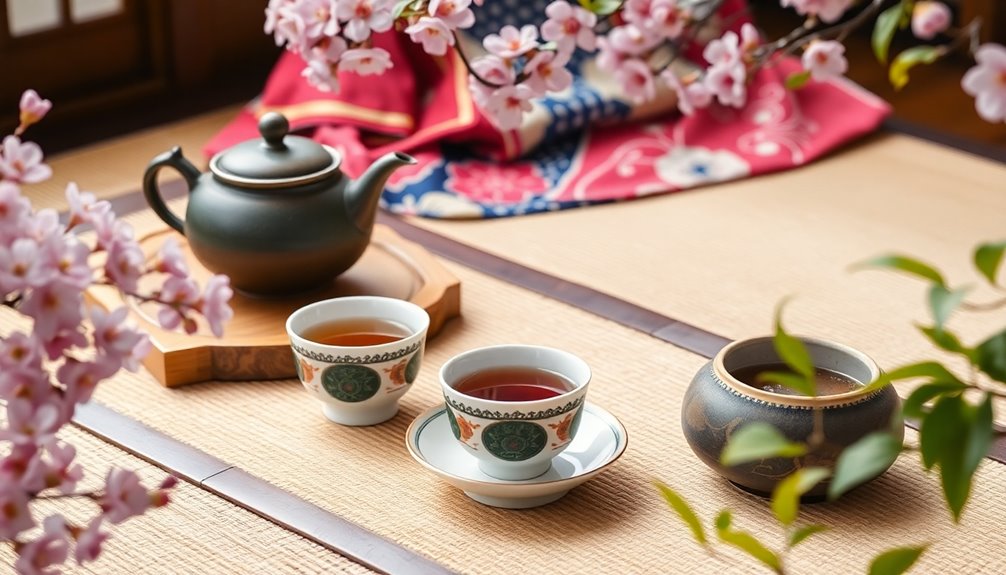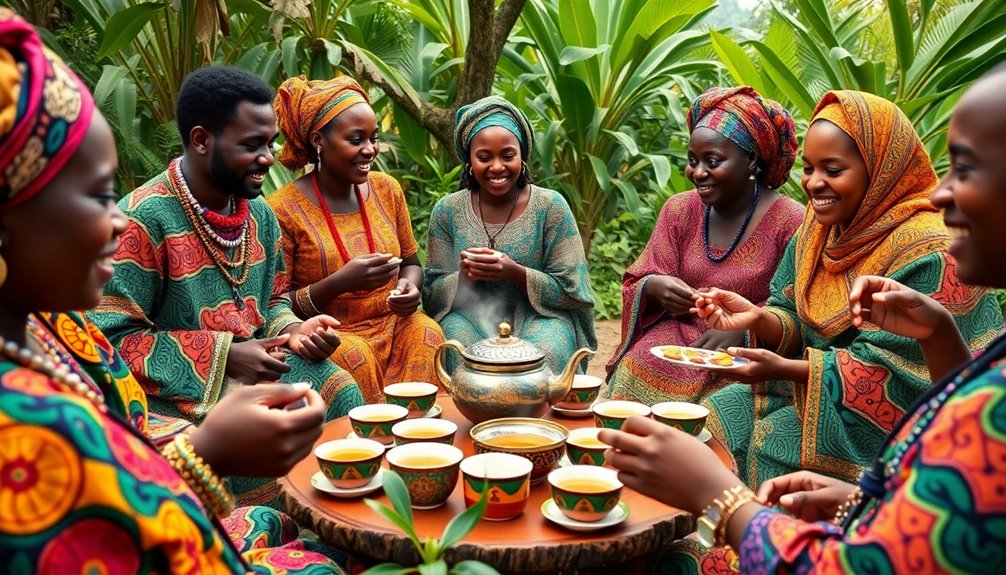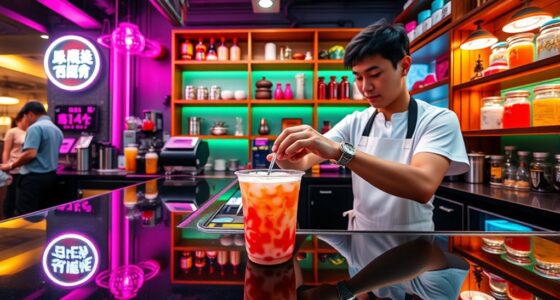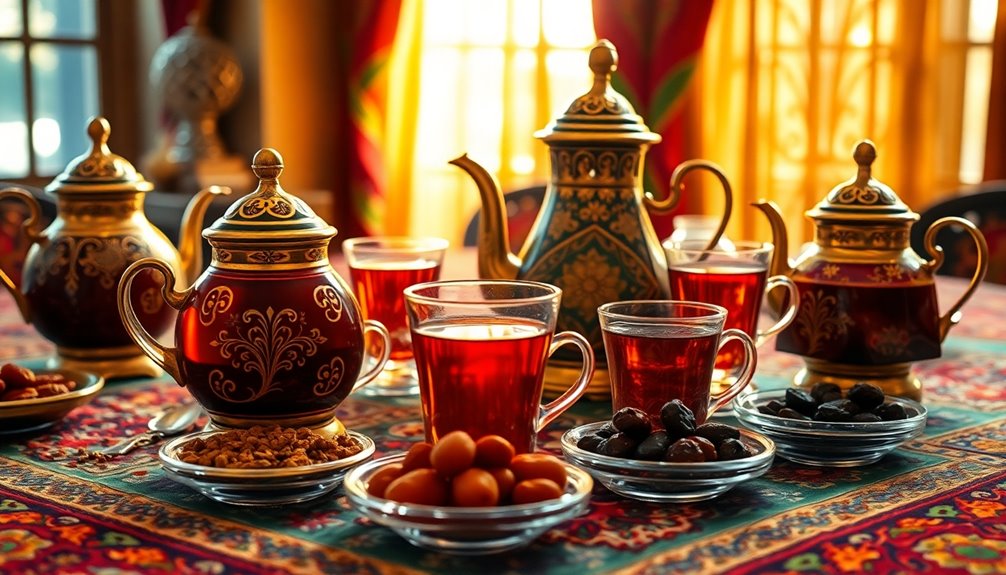Tea plays a vital role in Indian celebrations and everyday life, serving as a symbol of hospitality and togetherness. You often greet guests with a warm cup of tea, making them feel welcome. During festive times, tea is not just a drink; it's shared as prasad, spreading joy and blessings. At weddings, serving tea enhances the celebrations and strengthens family bonds. Evening tea brings families closer after their busy days, making every moment special. Let the rich traditions of tea bring warmth and connection to your life, and you'll discover even more of its delightful significance.
Key Takeaways
- Tea symbolizes hospitality in Indian culture, often served to guests during celebrations and family gatherings, enhancing social bonds.
- In weddings, tea is a vital element, with varieties like masala chai serving to showcase warmth and cultural values.
- Evening tea acts as a cherished family ritual, fostering connections and providing quality time after busy days.
- Tea stalls serve as cultural meeting points, promoting interactions and the exchange of ideas within the community.
- Tea is commonly offered as prasad during religious festivals, symbolizing blessings and reinforcing community ties.
Introduction
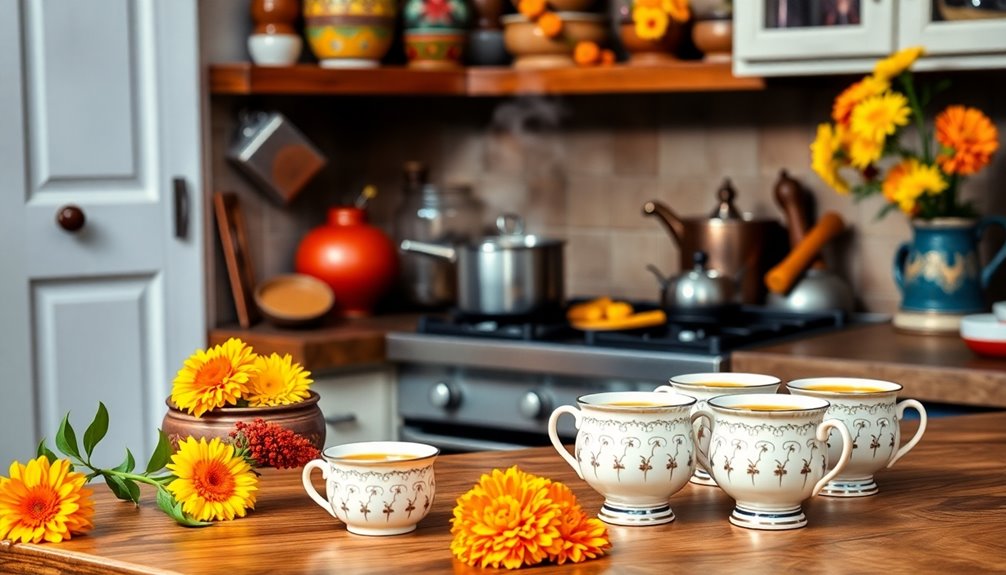
Tea serves as more than just a beverage in Indian culture; it's a cherished tradition woven into the fabric of celebrations. When you attend Indian celebrations, you'll likely find tea served to guests as a warm symbol of hospitality. This drink isn't just for special occasions; it plays a vital role in everyday life, too.
During family gatherings or social events, tea acts as a unifying element that brings people together. Imagine enjoying a cup during evening get-togethers, where laughter and stories flow freely.
It's also common to serve tea during religious festivals and ceremonies, often offered as prasad, which symbolizes blessings and community bonding.
In traditional practices, you might see tea offered to new brides or served in bed to newlyweds, highlighting its importance in cultural rituals.
Cultural Rituals Involving Tea
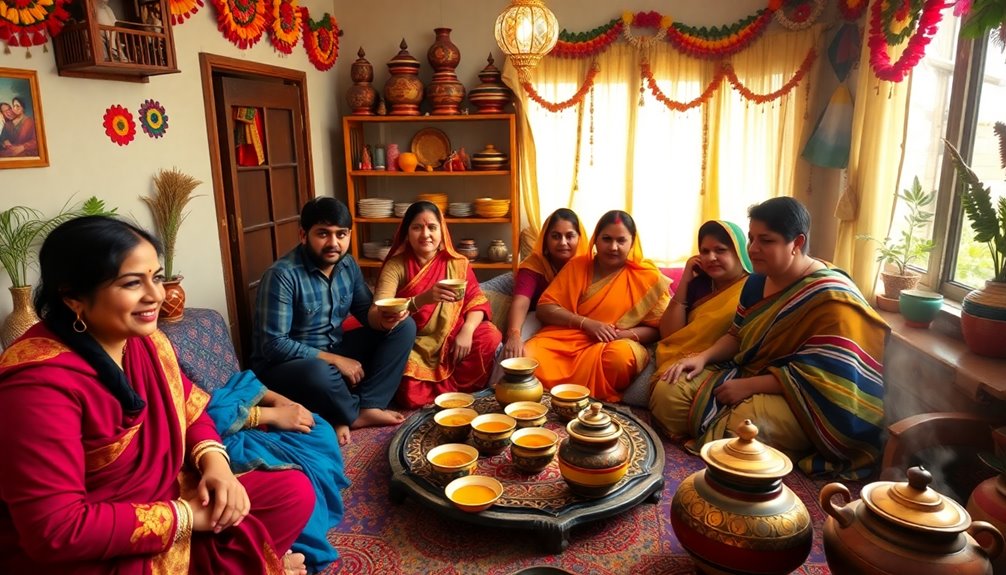
During family gatherings and celebrations, you'll often witness the significant role tea plays in various cultural rituals. Serving tea is a key part of hospitality, especially during social gatherings and festivities. When guests arrive, offering a warm cup of masala chai is a way to express warmth and kindness.
In Hindu religious ceremonies, tea can even be offered as prasad, symbolizing blessings and devotion among participants. New brides have a special role, as they traditionally serve tea on their first day in their in-laws' home, marking their integration into the family and showcasing the importance of hospitality.
Evening tea rituals are another cherished tradition, allowing family members to bond over steaming cups. Sharing stories and experiences during this time strengthens social ties and reinforces cultural values.
In different regions, you'll find unique tea-making rituals, like boiling tea with spices such as ginger and cardamom, which reflect local traditions and enhance community experiences.
These cultural rituals involving tea not only celebrate family bonding but also create a sense of belonging and connection among friends and neighbors.
Tea as a Social Connector
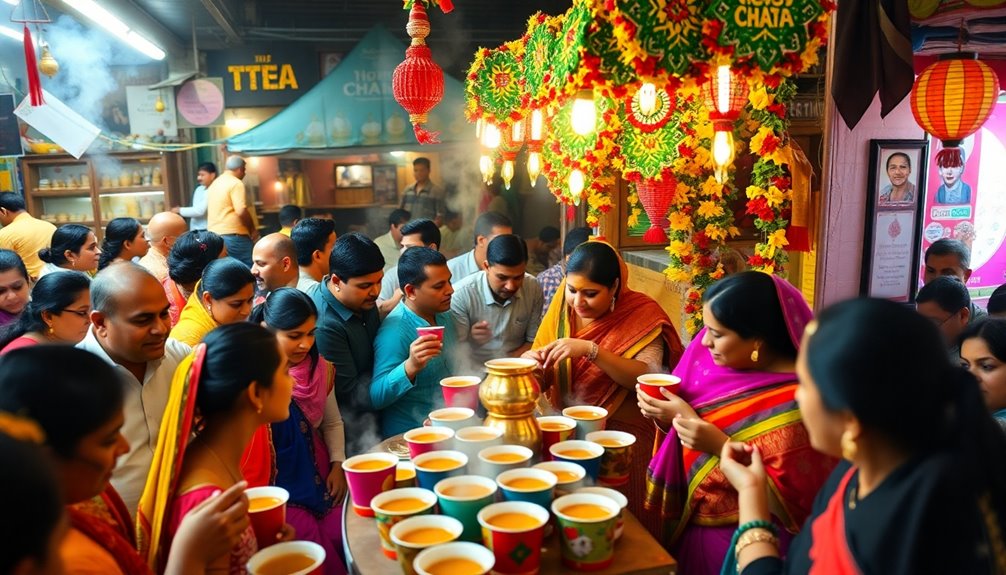
In Indian culture, sharing a cup of tea goes beyond mere enjoyment; it acts as a powerful social connector. When you invite friends or family over, offering chai symbolizes your hospitality and warmth. It's an essential part of social gatherings and celebrations, bringing everyone closer together.
During everyday life, evening tea becomes a special bonding time for families. You can share stories, laugh, and strengthen relationships over a warm cup.
In workplaces, tea breaks foster camaraderie among colleagues. These moments of relaxation lead to positive interactions that can improve teamwork.
Tea stalls and cabins in urban areas serve as popular meeting spots for friends and acquaintances. Here, sharing a cup of tea encourages cultural exchange and social networking. Whether you're discussing life or making plans, a simple cup of chai can create lasting memories.
During festive occasions, the preparation and serving of tea reflect rich cultural traditions. These shared experiences strengthen community ties, making celebrations even more special.
Tea in Indian Weddings
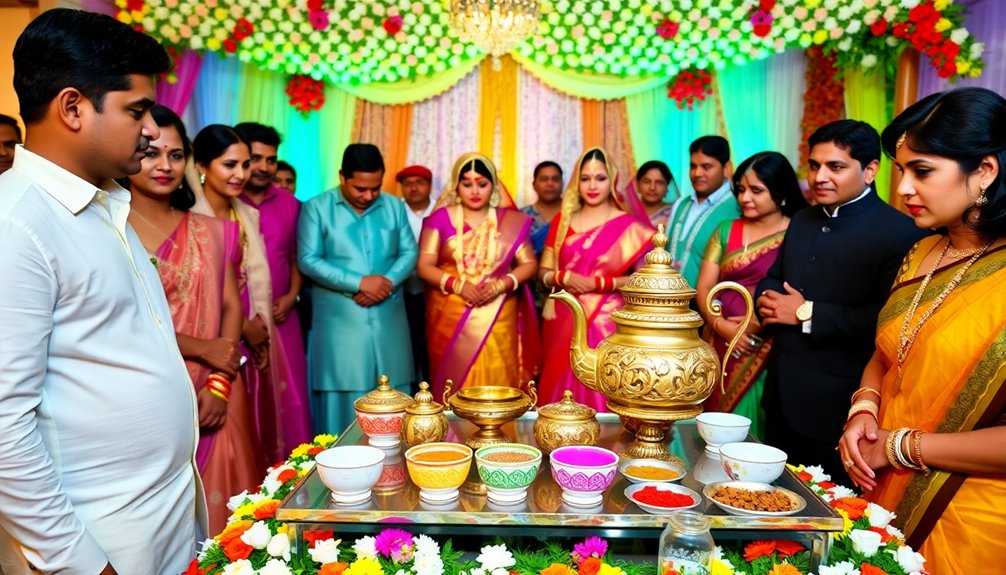
Indian weddings are vibrant celebrations filled with traditions, and serving tea is a cherished custom that embodies hospitality and warmth. When you attend an Indian wedding, you'll often find that tea in Indian weddings plays a crucial role in making guests feel welcome.
Varieties like masala chai and Kashmiri chai are popular choices on the wedding catering menu, adding delightful flavors to the festivities. Newly married brides are expected to serve tea to their in-laws and family members on their first day in the new household, demonstrating important cultural values and familial responsibilities.
During the wedding celebrations, tea breaks become special moments for socializing, allowing guests to bond over refreshments and share stories. Traditional tea-making rituals may also feature in pre-wedding ceremonies, highlighting tea's significance in family gatherings and cultural practices.
These rituals not only bring families together but also create lasting memories during joyful celebrations. So, whether you're sipping a warm cup of masala chai or enjoying the unique taste of Kashmiri chai, remember that tea is more than just a drink—it's a symbol of love, connection, and the spirit of togetherness that defines Indian weddings.
Health Risks of Excessive Consumption
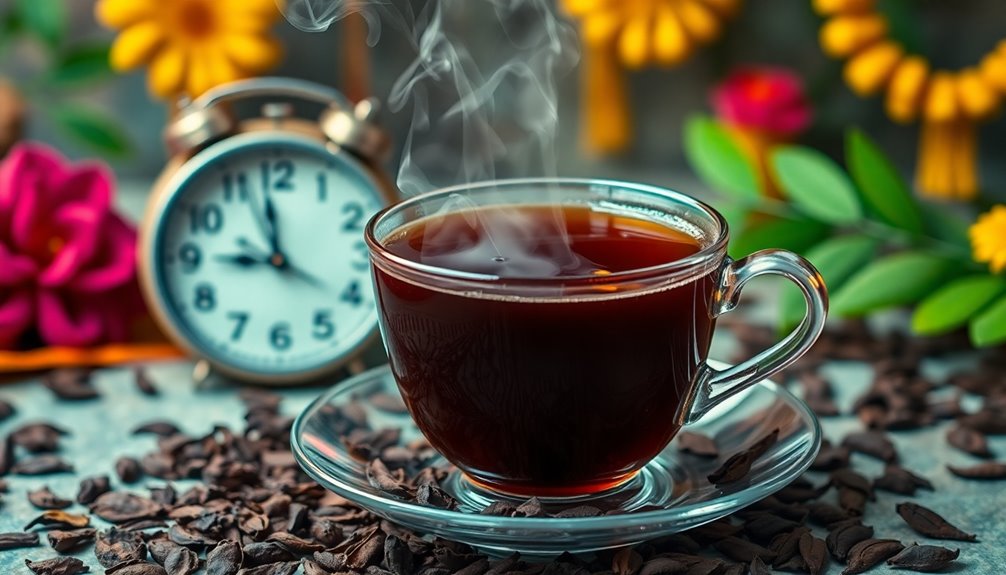
Overindulging in tea, especially varieties like masala chai, can sneak up on you with a range of health risks. While it's delightful to sip your favorite brew during celebrations, drinking too much can lead to problems. For instance, high caffeine intake from excessive consumption may cause insomnia, anxiety, and heart palpitations.
Moreover, the tannins in tea can interfere with iron absorption, which can be concerning if your diet lacks iron. If you're not careful, this might lead to iron deficiency anemia.
You also need to be mindful of dehydration; tea's diuretic properties can make you lose more fluids, causing imbalances if you don't drink enough water.
Additionally, studies suggest that excessive tea drinking might increase the risk of kidney stones, especially if you're already prone to them.
Sweetening your masala chai with sugar may taste good, but long-term excessive intake can contribute to weight gain and related health issues like obesity and type 2 diabetes.
Practical Applications
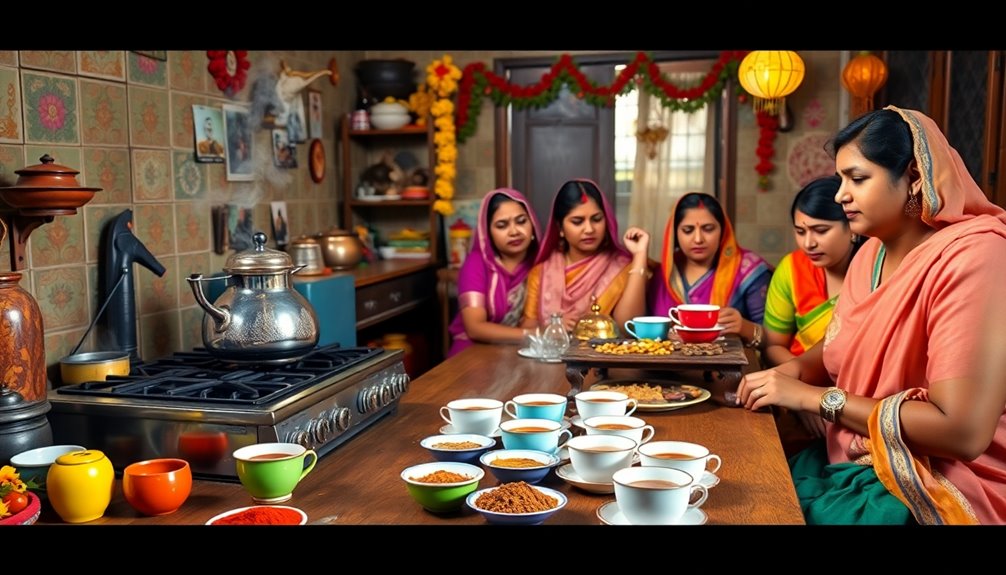
Tea plays a vital role in many social contexts, serving as a warm welcome for guests and fostering connections among families and friends. When you host a social gathering, offering chai right away shows your hospitality. It creates a cozy atmosphere where everyone feels at home.
In daily routines, morning tea is often a loving gesture, especially when prepared by family members. It kickstarts the day with care and warmth.
Evening tea is also special; it's a perfect time for family bonding after a busy day. You can gather everyone around the table, share stories, and enjoy each other's company.
At the workplace, tea breaks are essential too. They provide a chance for colleagues to interact, helping to build a positive workplace culture. These short breaks make a big difference in productivity and teamwork.
During cultural rituals, tea takes on extra importance. It's often served as prasad during religious festivals, symbolizing community devotion and shared joy.
Frequently Asked Questions
What Was Tea's Role in History?
Tea's role in history's fascinating. You see it transformed from a healing beverage to a colonial import, and eventually, it became a national staple, shaping social movements and contributing significantly to India's economy and culture.
What Is the Role of Tea?
Tea plays a vital role in your daily routine, offering comfort and warmth. It fosters connections, enhances social interactions, and brings people together, whether at home or in the workplace, enriching your life's experiences.
What Does Indian Tea Do?
Indian tea warms your spirit, invites conversations, and fosters connections. It energizes your day, refreshes your mind, and brings people together. You savor each sip, making every moment a little more special and meaningful.
What Is the Cultural Significance of Tea?
Tea's cultural significance lies in its ability to connect people. You share stories and create memories over a cup, fostering warmth and hospitality. Each sip carries traditions, love, and the essence of community in your life.
Conclusion
In conclusion, tea plays a vital role in Indian celebrations and daily life. It's not just a drink; it's a way to connect with friends and family, especially during weddings and festive occasions. Remember, while enjoying your tea, moderation is key to avoid health risks. So, next time you sip a cup, think about the rich traditions and joyful moments it brings. Embrace tea as a cherished part of your life, and enjoy every flavorful drop!

